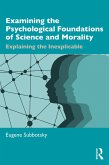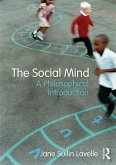Stephen Laurence, Eric Margolis
The Building Blocks of Thought (eBook, ePUB)
A Rationalist Account of the Origins of Concepts
24,95 €
24,95 €
inkl. MwSt.
Sofort per Download lieferbar

12 °P sammeln
24,95 €
Als Download kaufen

24,95 €
inkl. MwSt.
Sofort per Download lieferbar

12 °P sammeln
Jetzt verschenken
Alle Infos zum eBook verschenken
24,95 €
inkl. MwSt.
Sofort per Download lieferbar
Alle Infos zum eBook verschenken

12 °P sammeln
Stephen Laurence, Eric Margolis
The Building Blocks of Thought (eBook, ePUB)
A Rationalist Account of the Origins of Concepts
- Format: ePub
- Merkliste
- Auf die Merkliste
- Bewerten Bewerten
- Teilen
- Produkt teilen
- Produkterinnerung
- Produkterinnerung

Bitte loggen Sie sich zunächst in Ihr Kundenkonto ein oder registrieren Sie sich bei
bücher.de, um das eBook-Abo tolino select nutzen zu können.
Hier können Sie sich einloggen
Hier können Sie sich einloggen
Sie sind bereits eingeloggt. Klicken Sie auf 2. tolino select Abo, um fortzufahren.

Bitte loggen Sie sich zunächst in Ihr Kundenkonto ein oder registrieren Sie sich bei bücher.de, um das eBook-Abo tolino select nutzen zu können.
This is a broad and authoritative study of a central topic in the study of the mind: the origins of concepts. The authors a comprehensive rethinking of the foundations of the debate between rationalists and empiricists. They draw on a wealth of data across the cognitive sciences to make the case for a rationalist account, concept nativism.
- Geräte: eReader
- mit Kopierschutz
- eBook Hilfe
- Größe: 3.25MB
Andere Kunden interessierten sich auch für
![Examining the Psychological Foundations of Science and Morality (eBook, ePUB) Examining the Psychological Foundations of Science and Morality (eBook, ePUB)]() Eugene SubbotskyExamining the Psychological Foundations of Science and Morality (eBook, ePUB)37,95 €
Eugene SubbotskyExamining the Psychological Foundations of Science and Morality (eBook, ePUB)37,95 €![The Social Mind (eBook, ePUB) The Social Mind (eBook, ePUB)]() Jane Suilin LavelleThe Social Mind (eBook, ePUB)32,95 €
Jane Suilin LavelleThe Social Mind (eBook, ePUB)32,95 €![What Is It Like to Be a Bat? (eBook, ePUB) What Is It Like to Be a Bat? (eBook, ePUB)]() Thomas NagelWhat Is It Like to Be a Bat? (eBook, ePUB)8,95 €
Thomas NagelWhat Is It Like to Be a Bat? (eBook, ePUB)8,95 €![From Bacteria to Bach and Back: The Evolution of Minds (eBook, ePUB) From Bacteria to Bach and Back: The Evolution of Minds (eBook, ePUB)]() Daniel C. DennettFrom Bacteria to Bach and Back: The Evolution of Minds (eBook, ePUB)11,95 €
Daniel C. DennettFrom Bacteria to Bach and Back: The Evolution of Minds (eBook, ePUB)11,95 €![Integrity, Honesty, and Truth Seeking (eBook, ePUB) Integrity, Honesty, and Truth Seeking (eBook, ePUB)]() Integrity, Honesty, and Truth Seeking (eBook, ePUB)7,99 €
Integrity, Honesty, and Truth Seeking (eBook, ePUB)7,99 €![Childhood in Liberal Theory (eBook, ePUB) Childhood in Liberal Theory (eBook, ePUB)]() Nicolás BrandoChildhood in Liberal Theory (eBook, ePUB)70,95 €
Nicolás BrandoChildhood in Liberal Theory (eBook, ePUB)70,95 €![Virtue Ethics for the Real World (eBook, ePUB) Virtue Ethics for the Real World (eBook, ePUB)]() Howard J. CurzerVirtue Ethics for the Real World (eBook, ePUB)40,95 €
Howard J. CurzerVirtue Ethics for the Real World (eBook, ePUB)40,95 €-
-
-
This is a broad and authoritative study of a central topic in the study of the mind: the origins of concepts. The authors a comprehensive rethinking of the foundations of the debate between rationalists and empiricists. They draw on a wealth of data across the cognitive sciences to make the case for a rationalist account, concept nativism.
Hinweis: Dieser Artikel kann nur an eine deutsche Lieferadresse ausgeliefert werden.
Dieser Download kann aus rechtlichen Gründen nur mit Rechnungsadresse in A, B, BG, CY, CZ, D, DK, EW, E, FIN, F, GR, HR, H, IRL, I, LT, L, LR, M, NL, PL, P, R, S, SLO, SK ausgeliefert werden.
Hinweis: Dieser Artikel kann nur an eine deutsche Lieferadresse ausgeliefert werden.
Produktdetails
- Produktdetails
- Verlag: OUP eBook
- Seitenzahl: 688
- Erscheinungstermin: 7. August 2024
- Englisch
- ISBN-13: 9780192654175
- Artikelnr.: 72250430
- Verlag: OUP eBook
- Seitenzahl: 688
- Erscheinungstermin: 7. August 2024
- Englisch
- ISBN-13: 9780192654175
- Artikelnr.: 72250430
- Herstellerkennzeichnung Die Herstellerinformationen sind derzeit nicht verfügbar.
Stephen Laurence is Professor of Philosophy at the University of Sheffield. He received his PhD in Philosophy at Rutgers University and taught at the University of Manchester, Hampshire College, the London School of Economics, and the University of Hull. He is Director of the Hang Seng Centre for Cognitive Studies and directed the AHRC Innateness and the Structure of the Mind Project and the AHRC Culture and the Mind Project. He is co-editor of The Conceptual Mind and Concepts: Core Readings (both The MIT Press) among other books, and has published numerous articles in both philosophical and scientific journals. Eric Margolis is Professor of Philosophy at the University of British Columbia. He received his PhD in Philosophy at Rutgers University and taught at Rice University and the University of Wisconsin prior to his appointment at the University of British Columbia. He has received research funding from The Wisconsin Alumni Research Foundation, The Peter Wall Institute for Advanced Studies, and Canada's Social Science and Humanities Research Council. He is co-editor of The Oxford Handbook of Philosophy of Cognitive Science (OUP, 2012), and The Conceptual Mind (The MIT Press), among other books, and has published extensively in philosophical journals.
* 1: Introduction: Whatever Happened to the Debate Over Innate Ideas?
* PART I: The Rationalism-Empiricism Debate
* 2: What the Rationalism-Empiricism Debate is Really About
* 3: Why the Rationalism-Empiricism Debate Isn't the Nature-Nurture
Debate
* 4: The Viability of Rationalism
* 5: Abstraction and the Allure of Illusory Explanation
* 6: Concepts, Innateness, and Why Concept Nativism is about More Than
Just Innate Concepts
* 7: Conclusion to Part I
* PART II: Seven Arguments for Concept Nativism
* 8: The Argument from Early Development (1)
* 9: The Argument from Early Development (2)
* 10: The Argument from Animals
* 11: The Argument from Universality
* 12: The Argument from Initial Representational Access
* 13: The Argument from Neural Wiring
* 14: The Argument from Prepared Learning
* 15: The Argument from Cognitive and Behavioural Quirks
* 16: Conclusion to Part II
* PART III. Alternative Empiricist Perspectives
* 17: Methodological Empiricism
* 18: Neo-Associationism
* 19: Artificial Neural Networks: From Connectionism to Deep Learning
* 20: Neuroconstructivism
* 21: Perceptual Meaning Analysis
* 22: Embodied Cognition
* 23: Conclusion to Part III
* PART IV. Fodorian Concept Nativism
* 24: The Evolution of Fodor's Case Against Concept Learning
* 25: Not All Concepts Are Innate
* 26: Fodor's Biological Account of Concept Acquisition-and the
Importance of Cultural Learning
* 27: Conclusion to Part IV
* 28: Coda: Innate Ideas Revisited
* PART I: The Rationalism-Empiricism Debate
* 2: What the Rationalism-Empiricism Debate is Really About
* 3: Why the Rationalism-Empiricism Debate Isn't the Nature-Nurture
Debate
* 4: The Viability of Rationalism
* 5: Abstraction and the Allure of Illusory Explanation
* 6: Concepts, Innateness, and Why Concept Nativism is about More Than
Just Innate Concepts
* 7: Conclusion to Part I
* PART II: Seven Arguments for Concept Nativism
* 8: The Argument from Early Development (1)
* 9: The Argument from Early Development (2)
* 10: The Argument from Animals
* 11: The Argument from Universality
* 12: The Argument from Initial Representational Access
* 13: The Argument from Neural Wiring
* 14: The Argument from Prepared Learning
* 15: The Argument from Cognitive and Behavioural Quirks
* 16: Conclusion to Part II
* PART III. Alternative Empiricist Perspectives
* 17: Methodological Empiricism
* 18: Neo-Associationism
* 19: Artificial Neural Networks: From Connectionism to Deep Learning
* 20: Neuroconstructivism
* 21: Perceptual Meaning Analysis
* 22: Embodied Cognition
* 23: Conclusion to Part III
* PART IV. Fodorian Concept Nativism
* 24: The Evolution of Fodor's Case Against Concept Learning
* 25: Not All Concepts Are Innate
* 26: Fodor's Biological Account of Concept Acquisition-and the
Importance of Cultural Learning
* 27: Conclusion to Part IV
* 28: Coda: Innate Ideas Revisited
* 1: Introduction: Whatever Happened to the Debate Over Innate Ideas?
* PART I: The Rationalism-Empiricism Debate
* 2: What the Rationalism-Empiricism Debate is Really About
* 3: Why the Rationalism-Empiricism Debate Isn't the Nature-Nurture
Debate
* 4: The Viability of Rationalism
* 5: Abstraction and the Allure of Illusory Explanation
* 6: Concepts, Innateness, and Why Concept Nativism is about More Than
Just Innate Concepts
* 7: Conclusion to Part I
* PART II: Seven Arguments for Concept Nativism
* 8: The Argument from Early Development (1)
* 9: The Argument from Early Development (2)
* 10: The Argument from Animals
* 11: The Argument from Universality
* 12: The Argument from Initial Representational Access
* 13: The Argument from Neural Wiring
* 14: The Argument from Prepared Learning
* 15: The Argument from Cognitive and Behavioural Quirks
* 16: Conclusion to Part II
* PART III. Alternative Empiricist Perspectives
* 17: Methodological Empiricism
* 18: Neo-Associationism
* 19: Artificial Neural Networks: From Connectionism to Deep Learning
* 20: Neuroconstructivism
* 21: Perceptual Meaning Analysis
* 22: Embodied Cognition
* 23: Conclusion to Part III
* PART IV. Fodorian Concept Nativism
* 24: The Evolution of Fodor's Case Against Concept Learning
* 25: Not All Concepts Are Innate
* 26: Fodor's Biological Account of Concept Acquisition-and the
Importance of Cultural Learning
* 27: Conclusion to Part IV
* 28: Coda: Innate Ideas Revisited
* PART I: The Rationalism-Empiricism Debate
* 2: What the Rationalism-Empiricism Debate is Really About
* 3: Why the Rationalism-Empiricism Debate Isn't the Nature-Nurture
Debate
* 4: The Viability of Rationalism
* 5: Abstraction and the Allure of Illusory Explanation
* 6: Concepts, Innateness, and Why Concept Nativism is about More Than
Just Innate Concepts
* 7: Conclusion to Part I
* PART II: Seven Arguments for Concept Nativism
* 8: The Argument from Early Development (1)
* 9: The Argument from Early Development (2)
* 10: The Argument from Animals
* 11: The Argument from Universality
* 12: The Argument from Initial Representational Access
* 13: The Argument from Neural Wiring
* 14: The Argument from Prepared Learning
* 15: The Argument from Cognitive and Behavioural Quirks
* 16: Conclusion to Part II
* PART III. Alternative Empiricist Perspectives
* 17: Methodological Empiricism
* 18: Neo-Associationism
* 19: Artificial Neural Networks: From Connectionism to Deep Learning
* 20: Neuroconstructivism
* 21: Perceptual Meaning Analysis
* 22: Embodied Cognition
* 23: Conclusion to Part III
* PART IV. Fodorian Concept Nativism
* 24: The Evolution of Fodor's Case Against Concept Learning
* 25: Not All Concepts Are Innate
* 26: Fodor's Biological Account of Concept Acquisition-and the
Importance of Cultural Learning
* 27: Conclusion to Part IV
* 28: Coda: Innate Ideas Revisited







